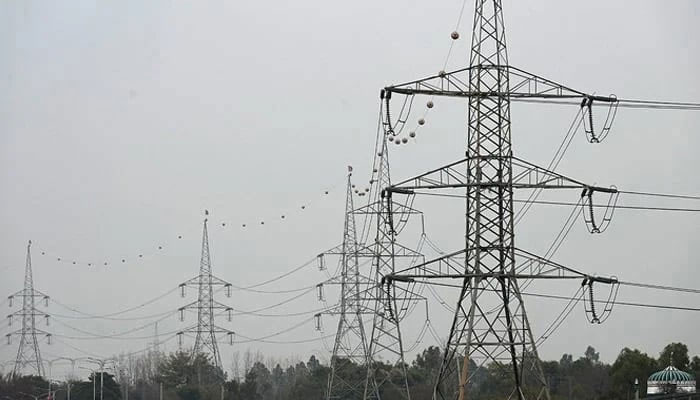Two-pronged strategy to tackle energy costs, debt
“The agreements with IPPs will be reviewed with mutual consultation,” sources said
ISLAMABAD: The Pakistani government is developing a comprehensive strategy to tackle the country’s escalating energy costs and mounting power sector circular debt burden, officials said.
A task force formed by Prime Minister Shehbaz Sharif is holding daily meetings to formulate a plan to reduce the generation tariffs of Independent Power Plants (IPPs), which have been a significant contributor to the soaring electricity costs in the country. Simultaneously, the government is negotiating with China to secure debt reprofiling and to convert power plants to coal fuel, according to sources close to the matter.
The discussions have primarily focused on identifying ways to lower the generation tariffs imposed by IPPs, which have long strained the national grid. The high tariffs, a result of previous agreements with IPPs, have significantly contributed to the rising costs of electricity, a burden the government is eager to alleviate. “The agreements with IPPs will be reviewed with mutual consultation,” sources said, underscoring the collaborative approach to revising the contracts.
In a parallel effort, Pakistan is engaging with Chinese authorities to secure debt relief through debt reprofiling, a process that involves extending the repayment terms of existing loans. These negotiations are crucial, as Pakistan’s financial obligations to China, particularly those tied to energy projects under the China-Pakistan Economic Corridor (CPEC), have been a significant factor in the country’s debt crisis.
In addition to these measures, the government is advancing plans to privatize several power distribution companies (Discos) to improve operational efficiency and service delivery. According to Leghari, the privatization process will be phased, with the most efficient Discos being offered to private investors first.
Minister for Power Awais Ahmad Khan Leghari, who chairs the task force, recently reported “positive developments” in the discussions with China. The negotiations also include converting power plants to coal, a move that could potentially reduce the operational costs of electricity generation.
He Leghari assured the public that the government is taking all possible measures to address issues in the power sector and provide relief to consumers, promising more good news in the coming weeks.
Prime Minister Shahbaz Sharif had previously written to the Chinese government, requesting assistance through debt reprofiling to help ease Pakistan’s financial strain, sources said. The discussions with China are seen as a critical step in managing the country’s debt load and securing more favorable terms for repayment.
After a recent meeting of the National Task Force on Implementation of Structural Reforms in the Power Sector, Leghari reiterated the government’s commitment to comprehensive reforms aimed at enhancing efficiency. The task force reviewed the stock and generation capacity of all IPPs and discussed the challenges facing the energy sector.
“The key objective is to reduce electricity prices to benefit consumers,” Leghari said. He dismissed rumors of a hike in electricity tariffs for August, stating that the task force had firmly objected to such claims. Contrary to reports of an increase, the power tariff was reduced by 77 paisa per unit, he said.
NEPRA on Thursday issued a notification for the fuel cost adjustment (FCA) for June, setting the adjustment for August’s billing at Rs2.56 per unit, down from Rs3.33/unit in July billing. This reduction provides consumers with a relief of 77 paisa per unit, Leghari noted.
-
 King Charles Is ‘clearly Worried’ Andrew Has Tarnished Royal Image
King Charles Is ‘clearly Worried’ Andrew Has Tarnished Royal Image -
 Royal Family Loses 'loyal' Worker After King Charles Disliked His Work?
Royal Family Loses 'loyal' Worker After King Charles Disliked His Work? -
 James Van Der Beek's Quiet Sacrifice Before Death Comes To Light
James Van Der Beek's Quiet Sacrifice Before Death Comes To Light -
 Suspect Kills Six Across Florida Before Taking His Own Life
Suspect Kills Six Across Florida Before Taking His Own Life -
 AI Helps Researchers Identify 2,000-year-old Roman Board Game Stone
AI Helps Researchers Identify 2,000-year-old Roman Board Game Stone -
 Inside Kate Middleton, Prince William’s Nightmare Facing Andrew Mountbatten-Windsor
Inside Kate Middleton, Prince William’s Nightmare Facing Andrew Mountbatten-Windsor -
 Margaret Qualley Shares Heartfelt Confession About Husband Jack Antonoff: 'My Person'
Margaret Qualley Shares Heartfelt Confession About Husband Jack Antonoff: 'My Person' -
 Savannah Guthrie Shares Sweet Childhood Video With Missing Mom Nancy: Watch
Savannah Guthrie Shares Sweet Childhood Video With Missing Mom Nancy: Watch -
 Over $1.5 Million Raised To Support Van Der Beek's Family
Over $1.5 Million Raised To Support Van Der Beek's Family -
 Paul Anthony Kelly Opens Up On 'nervousness' Of Playing JFK Jr.
Paul Anthony Kelly Opens Up On 'nervousness' Of Playing JFK Jr. -
 Diana Once Used Salad Dressing As A Weapon Against Charles: Inside Their Fight From A Staffers Eyes
Diana Once Used Salad Dressing As A Weapon Against Charles: Inside Their Fight From A Staffers Eyes -
 Video Of Brad Pitt, Tom Cruise 'fighting' Over Epstein Shocks Hollywood Fans
Video Of Brad Pitt, Tom Cruise 'fighting' Over Epstein Shocks Hollywood Fans -
 Jelly Roll's Wife Bunnie Xo Talks About His Huge Weight Loss
Jelly Roll's Wife Bunnie Xo Talks About His Huge Weight Loss -
 Margot Robbie Reveals Why She Clicked So Fast With Jacob Elordi
Margot Robbie Reveals Why She Clicked So Fast With Jacob Elordi -
 Piers Morgan Praised By Ukrainian President Over 'principled Stance' On Winter Olympics Controversy
Piers Morgan Praised By Ukrainian President Over 'principled Stance' On Winter Olympics Controversy -
 Halsey's Fiance Avan Jogia Shares Rare Update On Wedding Planning
Halsey's Fiance Avan Jogia Shares Rare Update On Wedding Planning




